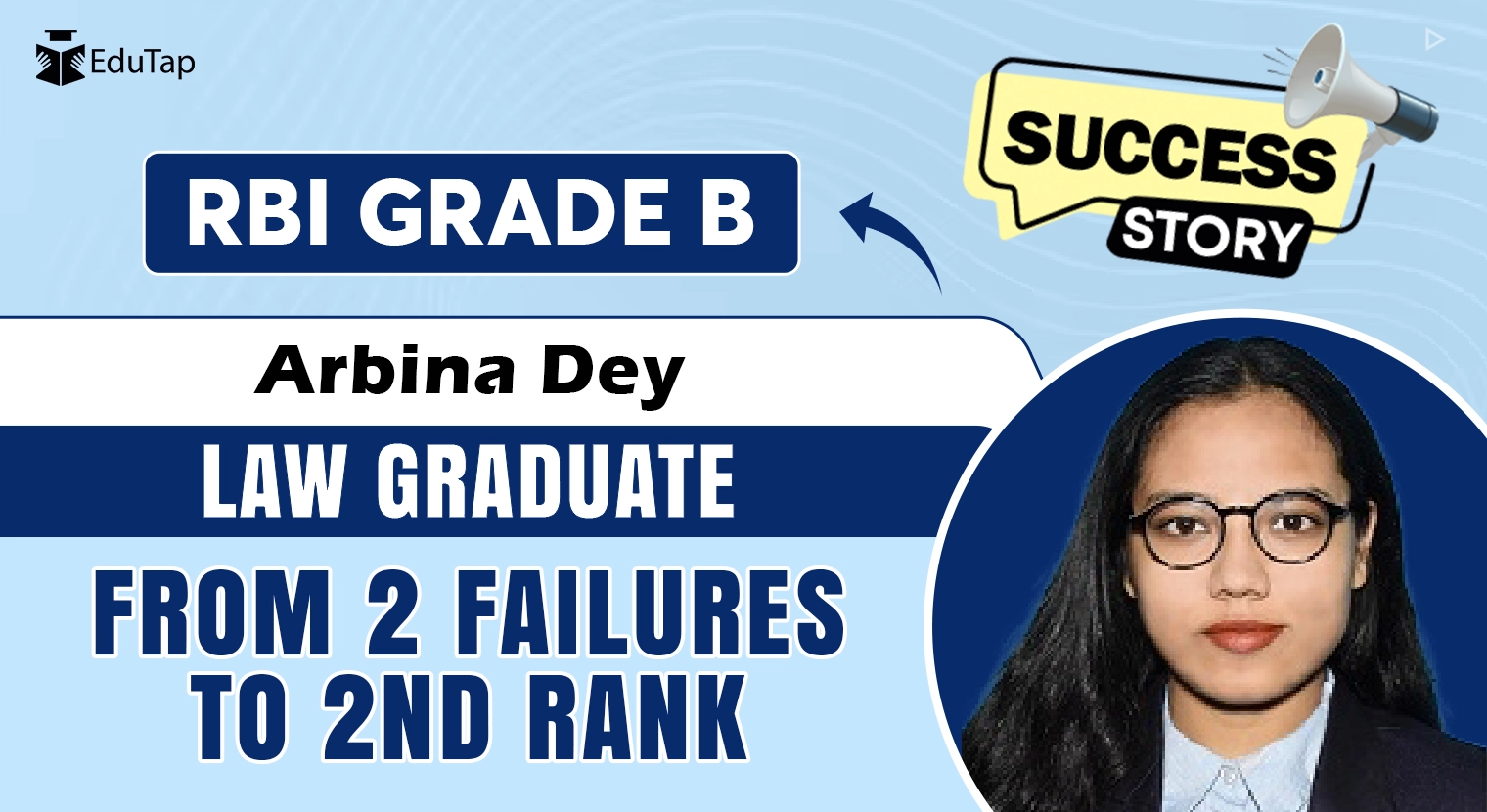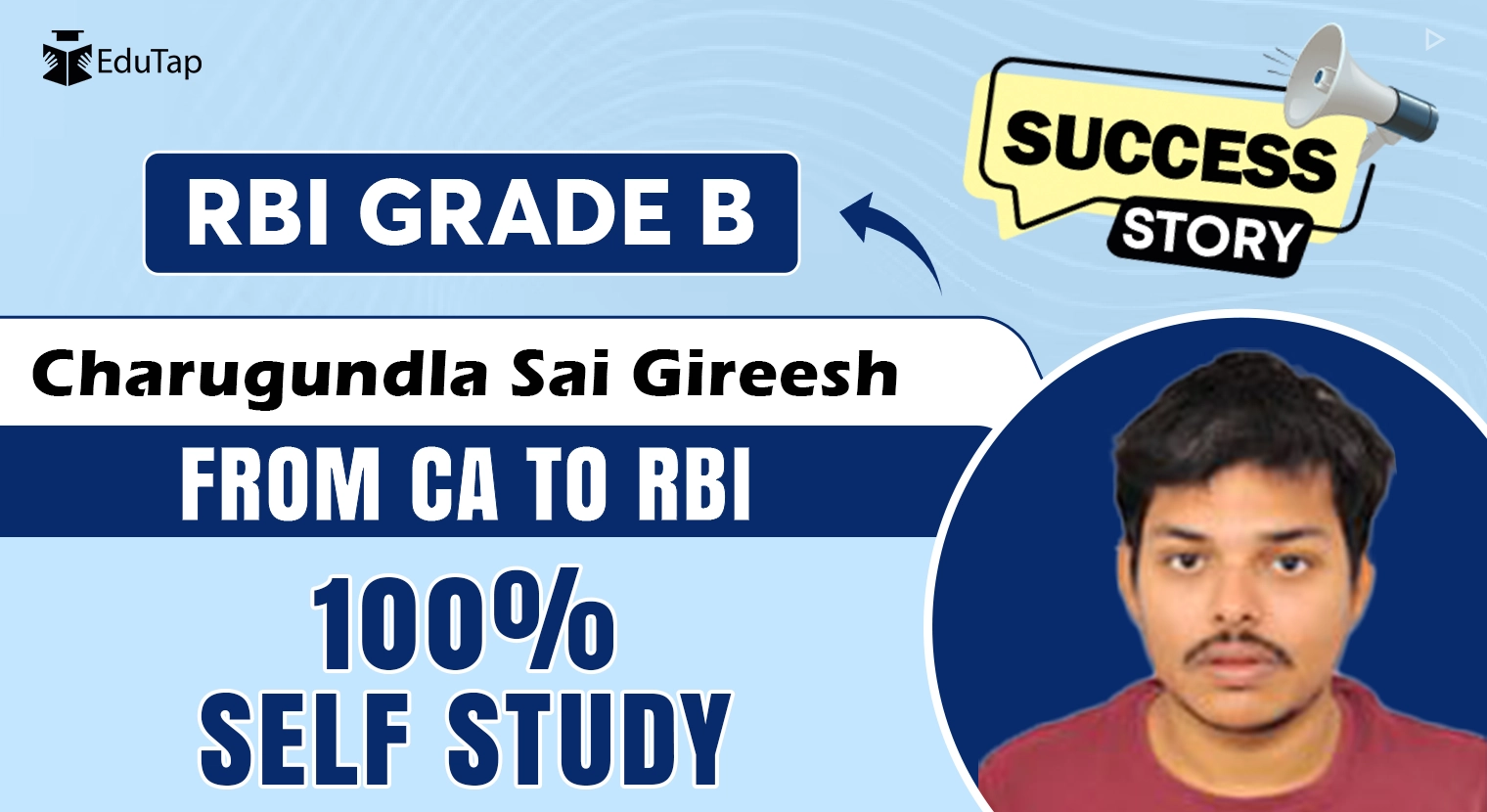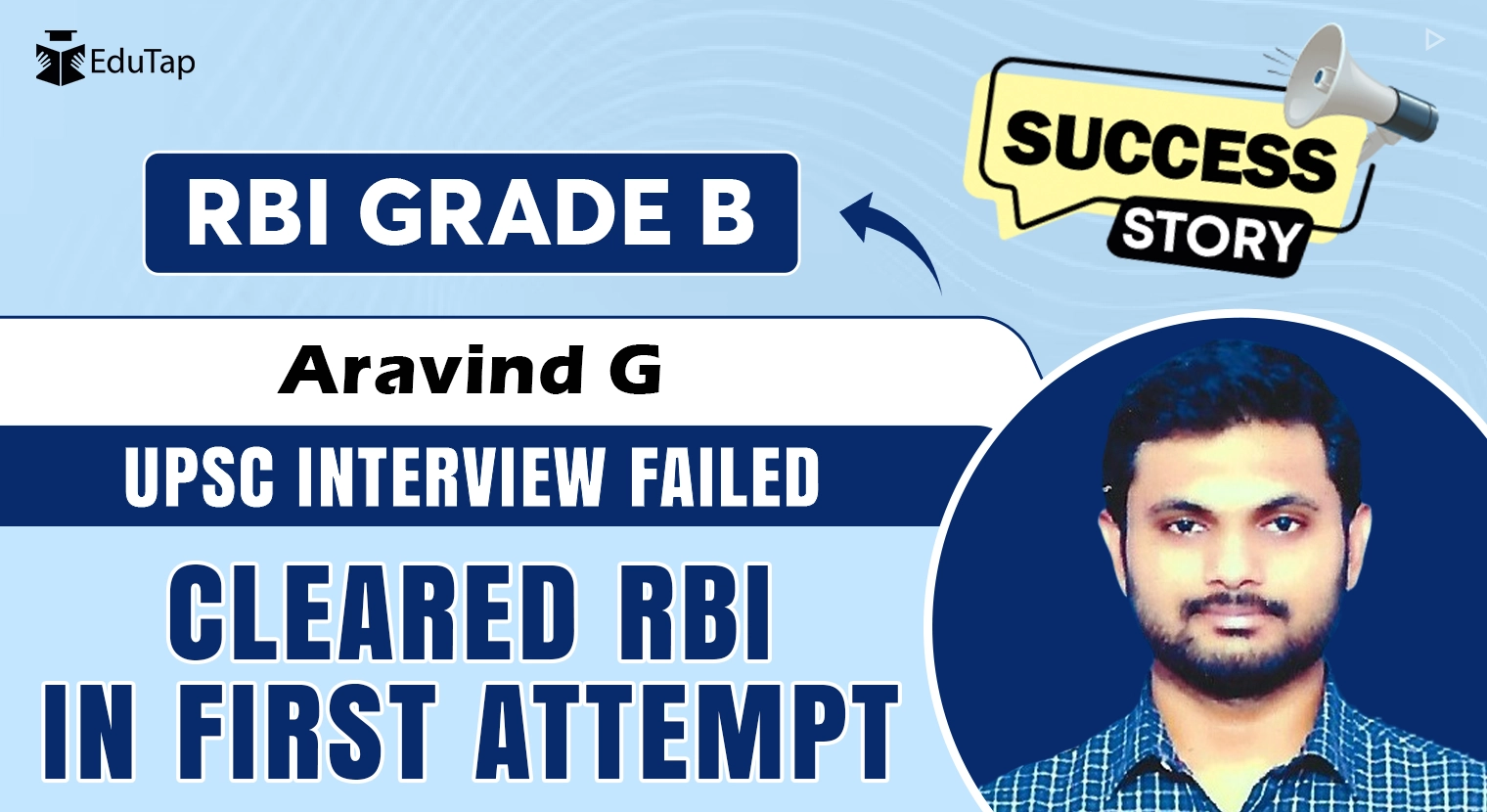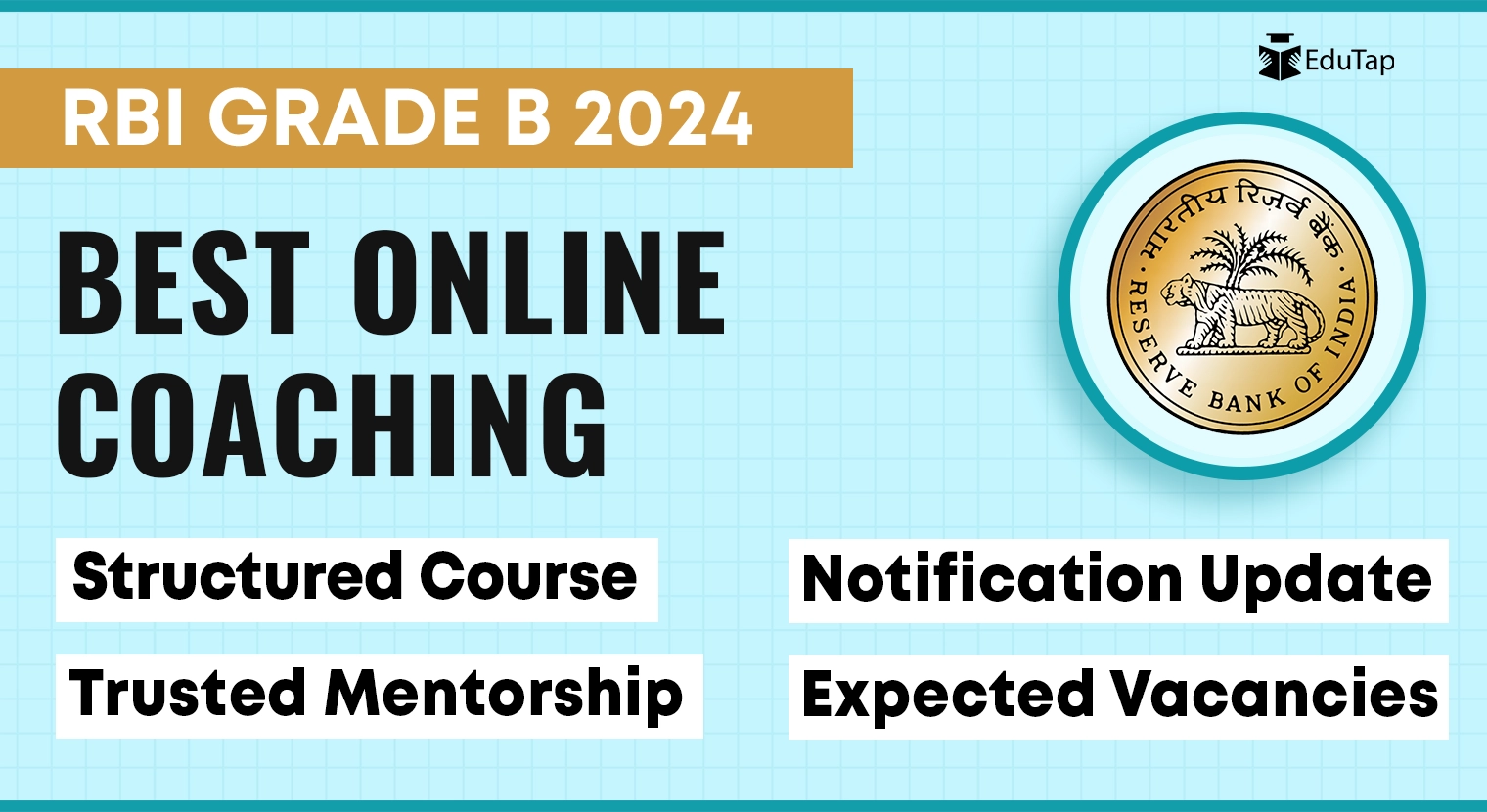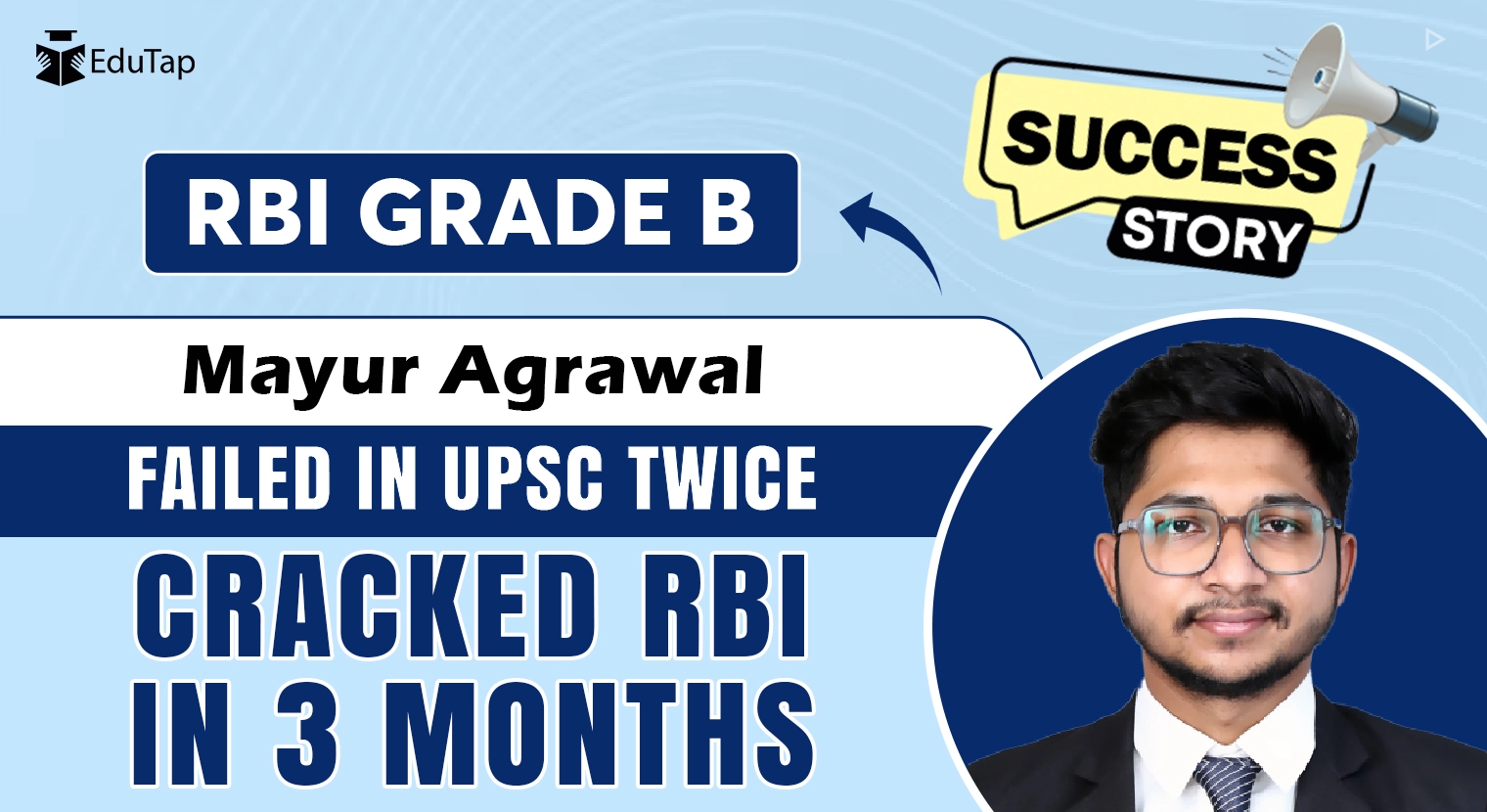Arbina’s path to becoming an RBI Grade B officer wasn’t easy. She faced setbacks in her first two attempts—failing the Prelims in the first and the Mains in the second. However, she never gave up, and on her third attempt, she not only cracked the RBI Grade B exam but also secured an impressive Rank 2!
In this article, Arbina shares her experiences and the winning strategy that drove her to success.
Background
- Graduated from law school
- Worked as a corporate lawyer
- Prepared for the UPSC CSE exam for sometime
- Took 3 attempts to crack the RBI Grade B exam
Brief Introduction
Following graduation, I entered the workforce as a corporate lawyer. However, my desire to pursue a career with the RBI led me to leave my job and focus solely on preparing for the RBI Grade B exam.
After a dedicated period of study, I re-entered the workforce but continued my exam preparation. While I wasn’t successful in clearing the exam in my previous 2 attempts, my perseverance paid off in the 3rd attempt. I cracked the RBI Grade B exam with a 2nd rank this time.

Why RBI Grade B?
Many law school graduates have promising careers ahead, especially in corporate law. It offers a lot of learning and growth. While it’s challenging and competitive, I know it’s not an easy path. For me, getting a job after my fourth year was important. As an only child, I needed to ensure my career wasn’t dependent on unpredictable exams.
However, even after taking the job, I knew I wanted to work in the public sector. So, I started preparing for the RBI Grade B exam simultaneously with my job. The desire to join this field was always at the back of my mind. Choosing corporate law wasn’t my ultimate goal; it was a necessary step that any responsible adult would take.
I worked as a corporate lawyer to become independent, but my ultimate goal was to become an RBI Grade B Officer.
My Shift from Law to RBI
Economic policy has always fascinated me since college, especially its impact on empowering people. Many of my peers from similar middle-class backgrounds aimed for the UPSC CSE (civil services) exam. I even prepared for it for a while.
However, I soon realized my interest was much narrower, and I wanted to focus more on the economy than other governance aspects. Becoming an officer with the country’s central bank seemed like the perfect place to learn and contribute. From my fifth year onward, I shifted my focus entirely to the RBI and started preparing for the exam.
RBI Grade B Preparation: With or Without Job, Which Is Better?
Although this question is very important, it ultimately depends on your personal circumstances. Leaving your job might be an option if you’re young, just starting out, and financially able to take a significant break from work. This could also be the case if your current job doesn’t offer the environment you need to prepare effectively for the RBI Grade B exam.
There are many valid reasons why someone might not be able to leave their job. You might have a family to support or simply prefer having a job. Many of my peers, like myself, chose to prepare for the RBI Grade B exam while working.
However, if you do choose to work while preparing, consistency is absolutely crucial. You can’t afford to waste time with the luxury of catching up the next day—you have other commitments. The same goes for those with domestic responsibilities, which can be equivalent to a full-time job. Consistency is key, and you might need to start studying earlier than others to cover the entire syllabus effectively.
Consider taking a few days off before each RBI Grade B exam phase. This dedicated time, whether for revision or practicing mock tests, can be extremely valuable. If taking leave isn’t feasible, that’s perfectly alright; there’s no single right way.
Preparing for the RBI Grade B exam with or without a job depends on your personal circumstances. There is no right answer.
RBI Grade B Preparation Tips for Working Aspirants
Based on my own journey, I want to emphasize something crucial for working candidates.
- Consistency and accountability are important, but don’t be too hard on yourself. If something isn’t working, you must adapt and adjust your strategy. However, being overly burdened leads to burnout, which hinders progress.
- Secondly, please avoid comparing your progress with that of full-time aspirants. The journeys of the two sets of candidates will naturally be very different. You’re on the right track as long as you’ve created a solid plan that covers the entire syllabus, schedules regular tests to gauge your progress and stick to that plan. Don’t compare yourself to others with different commitments and time constraints.
- Finally, if possible, try starting your day with a couple of hours of study before work. This could be reading a newspaper, practicing general knowledge, or taking a quiz. The key here is to stay on track and establish that you prioritize your studies before your workday and other commitments. This will set the right tone and remind you of your goals throughout the day.
Don’t be too hard on yourself. Avoid comparing your progress with that of full-time aspirants. Start your day with some productivity before work.
Why is it Important to Read Newspapers?
If you plan to join the RBI, get into the habit of reading the newspaper daily. In fact, the sooner you start, the better. For this exam, a purely mechanical approach isn’t enough. You need to be genuinely interested in the topics.
Reading a newspaper helps build an information structure in your mind. Everything you learn, from schemes to other topics, gets added to this framework, rather than being discrete pieces of data for the test. Newspaper reading will definitely help, not just in RBI Grade B Phase 1 but all the way through your interview.
I used to spend a lot of time reading newspapers, and I don’t regret it, even though I sometimes questioned whether spending two hours was truly beneficial. However, even if you can’t dedicate two or even one hour as you get closer to the exam, make sure to read a couple of important articles each day. It will definitely be helpful.
It might take an hour or two, but reading a newspaper will be worthwhile.
My Motivation
I used to be exhausted from work. Honestly, there were days when I simply couldn’t find the time to study. This frustrated me immensely because I knew it was crucial, but the time wasn’t there. In fact, one of the reasons I quit my first job before my second attempt was because it was incredibly demanding.
Failing the second attempt after quitting my job was one of the lowest points in my journey. However, I started doubting myself instead of rationally analyzing why I failed. I questioned whether leaving my job was a mistake, especially since I was jobless and taking a career break. The thought crept in that maybe RBI was not for me. I felt like I’d put in so much effort and still failed. Maybe giving up would be the right decision.
During this low point, I was on a call with one of my closest friends, pouring out my doubts and questioning whether I should continue preparing. Then, completely unexpectedly, that person randomly sent me a tablet (for preparation) for my next attempt. It was a huge, unexpected gift. My friend did it to remind me that I couldn’t afford to give up and wanted me to give it my all and leave no stone unturned in my next round of RBI Grade B preparation. That moment helped me refocus on my ultimate goal.
I also need to mention my mother’s role during this time. While I was unemployed and harshly criticizing myself for failing, she wouldn’t let me see it as a reflection of my worth. She insisted it was a consequence of poor strategy choices. She told me to rest, strategize better, and give it one last, full effort. She said, ‘You can consider other options if you don’t make it this time.’ Her belief in me, along with a few other key people in my life, kept me going. They all said, ‘Hey, we know you want this. Don’t give up; we’ll help you in any way we can to keep moving forward.’
Failing the second attempt after quitting my job was one of the lowest points in my journey.
My Learnings from Previous RBI Grade B Attempts
Here are the mistakes I made in my previous RBI Grade B attempts and my learnings from them:
My First RBI Grade B Attempt
In my first attempt, I failed to clear the RBI Grade B Prelims by a narrow margin, maybe a point or one and a half. However, the bigger issue was that I had to do a lot of guesswork. I knew this wouldn’t be a sustainable strategy for future attempts.
One key takeaway, particularly regarding the Quantitative section, was the need for deep conceptual clarity. The questions wouldn’t be straightforward, and I needed to learn time management and question selection. Simply memorizing concepts wouldn’t be enough. I needed to understand them well enough to tackle even the unfamiliar questions. Additionally, a lot of practice was crucial for effective time management. You can not solve all 30 questions in 25 minutes, and accepting that was a big realization.
My initial approach to the General Awareness section was also flawed. I naively thought it would be straightforward questions with readily available answers. However, the exam demanded a much greater depth of knowledge than I anticipated. I now emphasize this to my friends preparing for the RBI Grade B exam for the first time that this exam should not be taken lightly.
You can not solve all 30 questions in 25 minutes, and accepting that was a big realization for me after my first attempt.
My Second RBI Grade B Attempt
Taking the lessons from the first RBI Grade B attempt to heart, I prepared for my second attempt. I focused on strengthening both GA and Quant. While I wouldn’t say it was a breeze (Quant remained challenging for me), I did manage to pass the Prelims.
However, a major blunder on my part was neglecting the RBI Grade B Mains preparation until after the Prelims. While I studied the theoretical aspects, it wasn’t nearly as thorough as my Phase 1 preparation. That turned out to be disastrous and I understood that I needed to do a holistic study. Anchit Sir and other members of EduTap consistently mentioned the same.
Anchit Sir and other members of EduTap consistently stated that you need to prepare for the RBI Grade B Phase 1 and Phase 2 simultaneously.
My Third RBI Grade B Attempt
In my third RBI Grade B attempt, I took Phase 2 preparation very seriously from the start. I even started practicing Phase 2 mock tests before my Phase 1 mocks.
Making notes and reviewing theory isn’t enough for Phase 2. Treat it seriously from the beginning and integrate your preparation in a combined, synthesized way. That’s what I did in my third RBI Grade B attempt, and it made a significant difference.
I started practicing Phase 2 mock tests before Phase 1 for my 3rd RBI Grade B attempt.

My Weak RBI Grade B Subjects
As I’ve mentioned before, Quant was definitely the toughest section of RBI Grade B Phase 1, and I suspect many aspirants feel the same. Surprisingly, for Phase 2, Management gave me the most trouble. My friends even found that surprising—they couldn’t understand why Management was so difficult for me.
How I Tackled RBI Grade B Quant
I focused heavily on sectional tests. I will suggest to my fellow aspirants, like you, not to go in with a rigid plan like “I’m going to do this specific number of questions on each topic.” Even in your mock tests, analyze the types of questions being offered and practice different types within each topic.
By being comfortable with various question formats, you’ll be more prepared when encountering them in sectional tests, allowing you to manage your time more effectively. You can even set a target number of questions to answer correctly and strive to hit that goal in each mock test. That approach really helped me.
For Quant, I focused heavily on sectional tests.
How I Tackled RBI Grade B Management
The biggest challenge for me in Phase 2 was Management. During my second attempt, I felt like my memory failed me when writing descriptive answers. I had read and understood the material, but when it came to applying it in the exam, my mind had gone blank.
That led to scoring poorly in Finance and Management (though Finance was better because it focused on logical understanding rather than pure recall). On the other hand, Management required significant recall, which I struggled with. To address this issue, I didn’t just create mind maps for individual chapters; I created them for the entire subject.
For example, management involves planning, organizing, directing, and controlling. I made a flowchart outlining the chapters and key concepts under each stage. Then, I’d identify keywords for leadership styles and theories. Similarly, for communication, I’d list relevant topics. This logical flowchart helped me organize information rather than relying on rote memorization of isolated theories.
Many resources offer mind maps, but I recommend creating your own mind maps. Constructing a flowchart tailored to your needs is a learning activity that improves recall later. Additionally, I made concise two-page chapter notes with broad subheadings for quick reference. I added notes in my own words to further solidify the concepts. This was my approach to tackling Management for my third RBI Grade B attempt.
Create your own mind maps as they make it easy for you to recall.
My RBI Grade B Phase 1 Preparation Sources
Here are the resources I followed to prepare for the RBI Grade B Phase 1 exam:
General Awareness
For General Awareness, I used EduTap’s GA monthly magazines as my primary source. I skipped the weekly ones due to time constraints. I also used EduTap’s schemes, report documents, and RBI notifications. While reading, I highlighted key points and made notes—not extensive ones, mostly just data points.
Quant and Reasoning
For Quant and Reasoning, I followed a YouTube channel called Meritshine. Their videos were incredibly helpful. They explained concepts and covered different question types for each topic. I spent two to three dedicated weeks solely watching all their videos. Afterward, I could focus on practicing those concepts through sectional mock tests.
English
For English, I wasn’t using any particular source.
Mock Tests
For mock tests, I used a couple of platforms. Since I wasn’t using any specific resources for English or enrolled in a Math course, I knew I needed a lot of practice tests to improve through practice alone. Therefore, I subscribed to a couple of different platforms to access mock tests.
I used EduTap’s GA monthly magazines as my primary source for GA.
My RBI Grade B Phase 1 Preparation Strategy
I began my RBI Grade B preparation for Phase 1 with MeritShine videos. Once I finished them, I started practicing Quant and Reasoning. At the same time, I began practicing GA by reading and highlighting important points from reports and schemes, knowing this would also be helpful for Phase 2.
For Phase 1, I took around 15 to 20 mock tests. This became a significant part of my study strategy. This time around, I didn’t focus extensively on comprehensive theoretical study. Instead, I concentrated on understanding the exam’s requirements.
My strategy with mock tests involved taking 15-20 tests starting three weeks before the exam. I would complete one each day, focusing heavily on the GA questions. After some time, I noticed that there were some repeated questions, so these tests functioned as effective revision tools.
For Math questions, I wouldn’t analyze every single solution: that wouldn’t be time-efficient. I focused on solutions for questions I wasn’t able to solve myself, quickly noting the approach used. Those were my key strategies for RBI Grade B Phase 1 preparation.
Important Note: Don’t feel discouraged if you’re not able to give 15-20 mocks. Every mock test is a step forward.
For Phase 1, I took around 15 to 20 mock tests and concentrated on understanding the exam’s requirements.
RBI Grade B Phase 1 Preparation Tips
Here are the RBI Grade B Phase 1 preparation tips:
Tips for Quant
You need to be very selective with the questions you attempt in the Quant section. Here are some key points.
- Don’t go in with a fixed idea of what topics you’ll tackle.
- Have a general plan, (for example) focusing on arithmetic and avoiding probability, but still be flexible.
- Review the questions and assess their difficulty. Just because a topic like quadratic equations is typically considered easy doesn’t mean the specific question won’t be challenging.
- Don’t waste 10 minutes on a single question.
Selectivity and time management are crucial in this section, and sectional mock tests are the best way to practice.
For arithmetic questions, which tend to be a bit lengthy due to their straightforward nature, double-check your calculations. The answer choices might be very close, so be meticulous. Aim for a target of answering around 10 arithmetic questions correctly.
Be very selective with the questions you attempt in Quant.
Tips for English, GA, and Reasoning
For other sections like English, GA, Reasoning, and especially Critical Reasoning, here’s some important advice:
- Read the question carefully on your first pass.
- If you know the answer definitively, mark it and move on.
- If you’re unsure, don’t waste time dwelling on it based on your initial intuition.
- Instead, complete your first round of reviewing all the questions.
Even if you think you’re only spending 10 seconds pondering an uncertain question, that time can add up. I made this mistake and missed out on easier questions. There can be easier questions in the end.
So, avoid making the mistake I made. Go through all the questions once, then come back for a second pass. On the second pass, you might have a better understanding of how the answer choices fit within the context of other questions, allowing you to make a more informed decision. Ultimately, deciding whether to revisit an uncertain question is up to you, but this strategy can be very helpful.
Go through all the questions once, then come back for a second pass.

My RBI Grade B Phase 2 Preparation Strategy
Here is my RBI Grade B Phase 2 preparation strategy:
Finance and Management Static
For the static portion of Finance and Management, I relied on EduTap’s mind maps and practiced their mock tests. I found their materials very concise, using them to create my notes even before starting Quant and Reasoning.
After finishing Phase 1, I felt quite relaxed, but I knew I had to get started. I didn’t want to overwhelm myself, so I focused on enjoying the process. For a solid one month, I dedicated myself solely to creating notes for Finance and Management. I used a slim notebook and made notes for every chapter.
For FM static, I relied on EduTap’s mind maps and practiced their mock tests.
Finance and Management Current Affairs
To prepare for the current affairs of Finance and Management, I followed EduTap’s monthly magazines, the RBI notification documents, and their monthly tests. I made a note of any additional information not covered in my existing reading materials.
For FM current affairs, I followed EduTap’s monthly magazines, the RBI notification documents, and their monthly tests.
Economic and Social Issues Static
For ESI Static, to be honest, I paid a lot of attention to it in my first two attempts, but not as much this time. Instead, I focused heavily on chapter tests for the most important ESI Static chapters, such as poverty, alleviation, unemployment, sustainable development, etc.
These chapters contain concepts I hadn’t encountered before, so I took EduTap’s chapter tests and practiced mocks, reviewing the solutions thoroughly. Historically, ESI Static has proven more valuable for the descriptive section than the objective section. Therefore, my strategy for the ESI objective was different.
Since I was preparing for ESI Static with the intention of using it in my descriptive answers, I also relied heavily on my own research. While studying topics like poverty, alleviation, or unemployment, I would visit relevant websites like the World Bank, OECD, and IMF. I’d note down their definitions for terms like “poverty” and “financial inclusion” within the context of the specific chapter I studied.
For ESI static, I took EduTap’s chapter tests and practiced mocks, reviewing the solutions thoroughly.
Economic and Social Issues Current Affairs
For ESI Current Affairs, I reviewed the GA notes I had built since RBI Grade B Phase 1 preparation, covering schemes, reports, and notifications. I took a lot of monthly tests from EduTap and practiced mocks to supplement my knowledge and identify any gaps in my notes. Reviewing tests was incredibly helpful.
I formed a habit of taking a test, noting down the solutions, and updating any outdated data in my notes. Believe me, once you get in the habit, it’s not a huge time commitment.
For ESI current affairs, I reviewed the GA notes and took a lot of monthly tests from EduTap.
Descriptive English
For descriptive English, I did not do anything specific. However, I did write a couple of essays and two precis before the exam. For comprehension, I just looked at what they were asking in the exam. I didn’t practice comprehension but did essay and precis.
Descriptive Writing
For Descriptive Writing, I relied heavily on EduTap’s model questions and their evaluation mechanism. This proved to be crucial because, initially, my answers resembled essays. I was deviating from the topic, focusing on what I knew and using flowery language.
In my first-ever ESI mock, I attempted three questions and received a score of 16. The feedback I received was harsh but accurate, which was exactly what I needed. The feedback was specific, pointing out missing conclusions, unnecessary details in introductions, and a lack of coherence in the body paragraphs. They even suggested alternative structures like point-form for certain answers.
The most important factor was avoiding long gaps between practice papers. I actually began my descriptive writing mocks before RBI Grade B Phase 1, and by the time I started Phase 1, I was halfway through another set of descriptive mocks (around 30 total, split between FM and ESI).
I believe consistent practice is key, especially in the beginning. If you don’t apply what you learn right away, it’s like starting fresh each time. Daily practice allows you to compound your knowledge and develop a sense of the expected answer format.
For descriptive writing, I relied heavily on EduTap’s model questions and their evaluation mechanism.
Changes I Made in My Strategy
I was facing difficulties in recalling information and integrating it into answers. I knew I needed to include data points, but referencing specific schemes or reports I’d read months ago felt impossible. So, I developed a new strategy. I’d pre-select four questions for each practice session, focusing on comprehensive topics.
For example, if I chose a question on sustainable development, I’d aim for one requiring a historical analysis. Then, I’d dedicate two to two and a half hours daily to crafting answers for those four questions.
For poverty, I’d find the best definition, a PIB article outlining recent government initiatives, and a relevant report. I prepared answers by jotting down all the relevant data, recent reports, and potential solutions discussed by various organizations.
Afterward, I’d time myself while taking a mock test. Correlating my own pre-written answers with the timed mocks helped me retain information far more effectively than simply reading for the objective portion. I used this approach for all sections, including Management, where I’d prepare a well-structured answer with examples and then rewrite it for revision just before the exams.
Overall, I relied on EduTap and other platforms for Descriptive Writing practice questions.
How I Overcame RBI Grade B Interview Anxiety
Before the RBI Grade B interview, I only appeared for one interview for a law firm. Besides this, I had no interview experience. Up until the day before the interview, I was confident. Then, on the eve of the interview, it hit me. I was worried that nothing I said would impress the panel and that I wouldn’t be able to convince them why I wanted the job. All these doubts came rushing in.
Thankfully, a friend called just then—someone I hadn’t spoken to in a long time. I poured out my anxieties, asking my friend to listen to my answer about why I wanted to work at RBI. Since my background was quite different, I felt this was a crucial question.
I got valuable feedback as I practiced the answer with my friend. I learned my answer sounded too polished, making it cliche. However, my reasons for wanting to work at RBI were actually quite unique and personal. My friend urged me to be honest about them. This conversation set the tone for my interview approach. I realized being honest about my choices without needing to justify them.
I was again quite nervous on the day of the RBI Grade B interview. Everyone else in the waiting room seemed nervous, too. So, I tried to make some light, casual conversation, nothing disruptive. I figured that not taking the day too seriously would help. At the end of the day, it was just another day in my life. The key was to relax, be honest, and trust the advice. It might sound cliché, but it was true.
My friend’s advice, to be honest, helped me reduce my Interview anxiety.
My RBI Grade B Interview Experience
When I walked into the room, there was an immediate switch, to be honest. I wouldn’t say I wasn’t scared, but the panel was very warm and welcoming, which helped me calm myself. They welcomed me to a seat and began the interview with basic personal questions. I was able to be honest with them, and after the interview, a key realization struck me: as a candidate, you truly need to know your profile thoroughly, prepare basic HR questions, and avoid self-judgment.
Based on my experience, here are some RBI Grade B interview preparation tips:
Thoroughly Prepare Your Profile
Knowing your profile is important. You do need to be well-versed in the subjects you studied in your graduation and any fields you’ve worked in. In my case, they asked me a lot of questions from my legal background, and thankfully, I was able to answer them effectively. This set a positive tone for the interview.
Thoroughly Prepare HR Part
The second important aspect is the HR part, focusing on your personal reasons and choices. As I mentioned before, confidence in your choices is crucial. If you’re confident, you’ll be able to communicate your reasons effectively.
Of course, there will be questions you don’t know the answer to. In those situations, what really helped me was being authentic. Be transparent about what you know and what you don’t. Don’t try to sound overly smart or mislead them by twisting the question or offering irrelevant information. Just be honest about your approach to the question. If you know the answer, that would be great. If not, be upfront.
Avoid Self-Judgement
The most important thing during the interview is to avoid self-judgment while sitting in front of the panel. You can evaluate yourself later. You’re not expected to be perfect or know everything. Constantly judging yourself about what you just said will only hurt your chances. Focus on how you’ll answer the next question, not whether your previous answer was perfect. If something isn’t clear, trust me, they’ll ask for clarification. Give your best shot.
I remember making a basic mistake, something they clearly knew was wrong, but it was likely due to pressure. They laughed about it, I corrected myself, and we moved on. Don’t overthink your mistakes; they’re human beings, and they’ll give you some grace.
As a candidate, you truly need to know your profile thoroughly, prepare basic HR questions, and avoid self-judgment.
My RBI Grade B Result
While desperately waiting for the results to be released, I had to travel to attend a friend’s wedding. I hoped the results would come out during the trip because finding out bad news while attending a wedding would be awful.
As it happened, I was waiting at the airport, about to board, when the results came out. A friend I was traveling with told another friend the results were out. I pleaded with them, ‘Don’t show me the PDF yet! I’m not ready to look at it!’ My friend agreed and suggested, “I should relax and have some coffee.”
So there I sat, reciting the Hanuman Chalisa, a prayer for strength. Guess what? My friend, of course, ignored my pleas and checked the results. My friend simply said, ‘Hey, you made it!’ Relief washed over me. That’s how I found out my RBI Grade B result.
I called my mom right away. She did not cry easily, but she was emotional on the phone. Unfortunately, I wasn’t there to see her in person, but I think it was mostly because she saw how much this accomplishment meant to me. Knowing she’d seen my hard work pay off was a very sweet moment.

RBI Grade B Exam Preparation Tips
Here are some tips that I learned during my RBI Grade B journey:
- Having your heart in the RBI Grade B exam is extremely important. It will help you back up even if you fall down along the way. So, just have a strong “why,” you must know why you want to join RBI.
- Watch a lot of strategy videos, as I did. But please do not try to emulate any of those. You should take important points from those RBI Grade B strategy videos and create your own strategy.
- Have a plan at all times, even if you’re not following 10% of it. However, while making the plan, be realistic with yourself.
- If you’re not going the way that you wanted to be, change your plan not the goal. Don’t give up so easily, simply increase your efforts.
- If you’re a working candidate make sure you go out on the weekends for at least an hour. It will help you not lose your mind to the anxiety that this exam may put you through.
Important Note: These tips are completely my personal opinion. You may actually do something exactly opposite and get rank one.
Here is a video in which Ms. Arbina Dey explains her RBI Grade B preparation strategy.
Conclusion
Now that you have understood how Arbina overcame her fear of multiple failures and cracked the RBI Grade B exam in her 3rd attempt. Use her strategy, recommended resources, preparation tips, etc., as a reference to create your own strategies according to your strengths and weaknesses.
